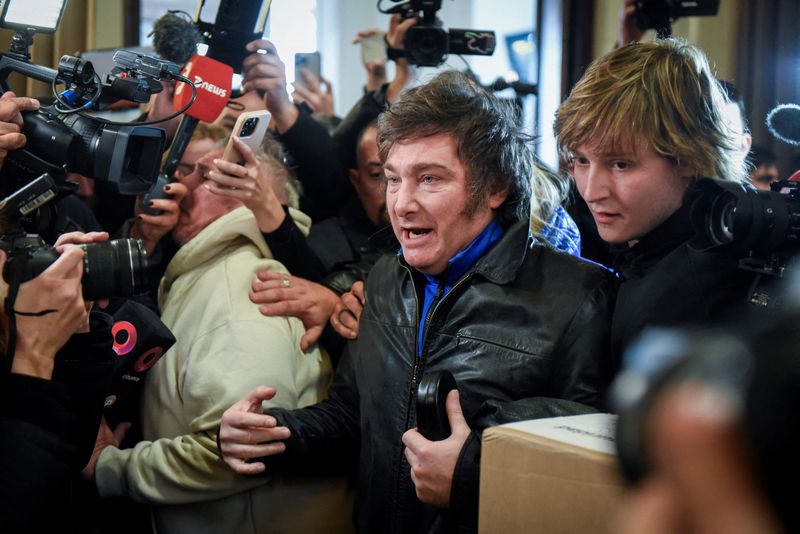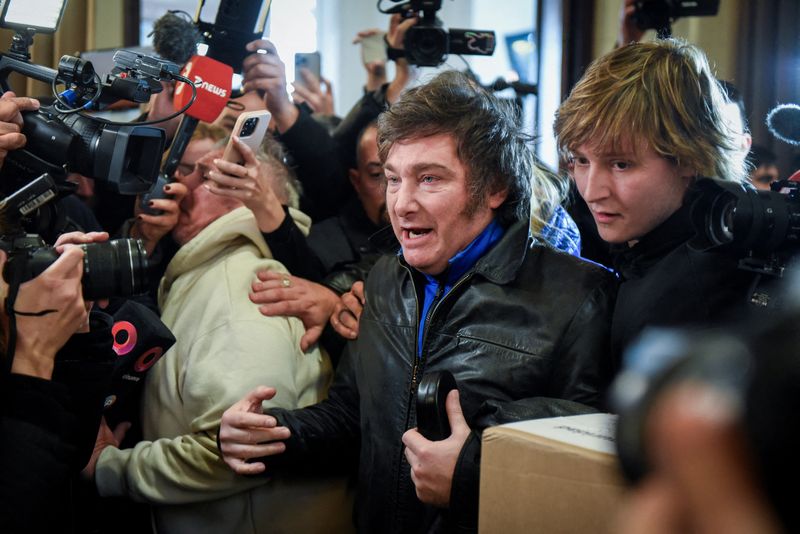Economy
Analysis-Could Argentine radical libertarian Javier Milei win the presidency?


© Reuters. FILE PHOTO: Argentine presidential candidate Javier Milei of La Libertad Avanza alliance arrives to vote during Argentina’s primary elections, in Buenos Aires, Argentina August 13, 2023. REUTERS/Mariana Nedelcu/File Photo
2/2
By Adam Jourdan, Eliana Raszewski and Anna-Catherine Brigida
BUENOS AIRES (Reuters) -Argentine far-right libertarian Javier Milei shocked the country on Sunday when he won the largest share of the vote in open primary elections. Now the big question is can he repeat the trick in October general elections when it matters?
The primary, which sees all candidates compete against one another, is a good gauge of how the general election will go. Milei won 30% of the vote, just ahead of the main conservative bloc on 28% and the center-left ruling Peronists on 27%.
The firebrand economist, whose boisterous campaign rallies draws comparisons to former U.S. leader Donald Trump, could turn the political status quo on its head in Argentina. He has pledged to shutter the central bank, dollarize the economy and sharply cut state spending.
Milei, however, faces a bigger challenge to win the Oct. 22 general election, or likely a run-off in November, with some voters casting protest votes on Sunday and record low turnout, which dented the more traditional parties.
Those trends could shift in the next two months.
Economy Minister Sergio Massa, the candidate for the governing Peronist coalition, said that the primary vote was just the “first half” of the election competition, using a soccer analogy in the country of greats Lionel Messi and Diego Maradona.
“We have the second half, extra time and then penalties. And we will be fighting until the last minute,” he said after the vote, which saw his coalition, the country’s top political force for decades, post its worst primary election result.
Analysts said that more people could come out to vote in October after 69.5% turnout in the primary. There is on average a 4 percentage point bump in voter numbers between the primaries and the general election, J.P. Morgan said in a note.
This suggests “higher upside for traditional parties in the general elections as compared to Milei, which we see closer to its ceiling in terms of vote intention”.
‘MILEI PRESIDENT!’
That potential challenge has done little to dampen spirits in Milei’s camp, delighted at far exceeding pollster estimates of around one-fifth of the vote in the primary.
“We can feel it! Milei president!”, his fans chanted as the elections results were announced.
The Together for Change conservative coalition pledged to unite behind its elected candidate Patricia Bullrich, a hard-line former security minister, though she said the vote had revealed that people wanted something new.
“This is a society that’s demands deep change, down to the roots,” she said, promising security, reasonable taxes and ending years of uncertainty and government red tape.
Julio Cobos, a lawmaker with Together for Change, agreed voters had expressed themselves in the polls and were demanding profound change, but the race was still very much open.
“The challenge is the final election which is October,” he said, adding the coalition had plenty of room to boost its performance if it stuck together.
“We hope to grow and win in the next elections. It is important that the leaders show up together, unify proposals, speeches, and present as a good team,” he said.
Beyond doubt is the fact that the race, previously seen as between the two main parties with Milei a dark horse likely grabbing an notable third place, is now a true three-way fight. Each of the top candidates could make the run-off.
“The election race is now divided in three, which it wasn’t before,” said Alejandro Corbacho, director of the political science program at Argentine university UCEMA.
“It is clear that there is a lot of anger. People are very angry with the political classes.”
Jared Lou, a portfolio manager at William Blair Investment Management, said that Milei had made himself the “front-runner” but there was lots of uncertainty.
“One factor that may help Milei in the presidential elections is that he’s an outsider and voters are frustrated,” he said. Lou added his views on promoting gun ownership, anti- abortion policies and dollarizing the economy – something most Argentines oppose – could ultimately put off some voters.
A dollar-peso peg introduced in the 1990s brought short-term benefits but ended in an ugly devaluation.
“Many of the policies he has campaigned on are viewed as fairly radical by the electorate.”
Economy
Russian central bank says it needs months to make sure CPI falling before rate cuts -RBC


© Reuters. Russian Central Bank Governor Elvira Nabiullina attends a news conference in Moscow, Russia June 14, 2019. REUTERS/Shamil Zhumatov/File Photo
MOSCOW (Reuters) – Russia’s central bank will need two to three months to make sure that inflation is steadily declining before taking any decision on interest rate cuts, the bank’s governor Elvira Nabiullina told RBC media on Sunday.
The central bank raised its key interest rate by 100 basis points to 16% earlier in December, hiking for the fifth consecutive meeting in response to stubborn inflation, and suggested that its tightening cycle was nearly over.
Nabiullina said it was not yet clear when exactly the regulator would start cutting rates, however.
“We really need to make sure that inflation is steadily decreasing, that these are not one-off factors that can affect the rate of price growth in a particular month,” she said.
Nabiullina said the bank was taking into account a wide range of indicators but primarily those that “characterize the stability of inflation”.
“This will take two or three months or more – it depends on how much the wide range of indicators that characterize sustainable inflation declines,” she said.
The bank will next convene to set its benchmark rate on Feb. 16.
The governor also said the bank should have started monetary policy tightening earlier than in July, when it embarked on the rate-hiking cycle.
Economy
China identifies second set of projects in $140 billion spending plan


© Reuters. FILE PHOTO: Workers walk past an under-construction area with completed office towers in the background, in Shenzhen’s Qianhai new district, Guangdong province, China August 25, 2023. REUTERS/David Kirton/File Photo
SHANGHAI (Reuters) – China’s top planning body said on Saturday it had identified a second batch of public investment projects, including flood control and disaster relief programmes, under a bond issuance and investment plan announced in October to boost the economy.
With the latest tranche, China has now earmarked more than 800 billion yuan of its 1 trillion yuan ($140 billion) in additional government bond issuance in the fourth quarter, as it focuses on fiscal steps to shore up the flagging economy.
The National Development and Reform Commission (NDRC) said in a statement on Saturday it had identified 9,600 projects with planned investment of more than 560 billion yuan.
China’s economy, the world’s second largest, is struggling to regain its footing post-COVID-19 as policymakers grapple with tepid consumer demand, weak exports, falling foreign investment and a deepening real estate crisis.
The 1 trillion yuan in additional bond issuance will widen China’s 2023 budget deficit ratio to around 3.8 percent from 3 percent, the state-run Xinhua news agency has said.
“Construction of the projects will improve China’s flood control system, emergency response mechanism and disaster relief capabilities, and better protect people’s lives and property, so it is very significant,” the NDRC said.
The agency said it will coordinate with other government bodies to make sure that funds are allocated speedily for investment and that high standards of quality are maintained in project construction.
($1 = 7.1315 renminbi)
Economy
Russian central bank says it needs months to make sure CPI falling before rate cuts -RBC


© Reuters. Russian Central Bank Governor Elvira Nabiullina attends a news conference in Moscow, Russia June 14, 2019. REUTERS/Shamil Zhumatov/File Photo
MOSCOW (Reuters) – Russia’s central bank will need two to three months to make sure that inflation is steadily declining before taking any decision on interest rate cuts, the bank’s governor Elvira Nabiullina told RBC media on Sunday.
The central bank raised its key interest rate by 100 basis points to 16% earlier in December, hiking for the fifth consecutive meeting in response to stubborn inflation, and suggested that its tightening cycle was nearly over.
Nabiullina said it was not yet clear when exactly the regulator would start cutting rates, however.
“We really need to make sure that inflation is steadily decreasing, that these are not one-off factors that can affect the rate of price growth in a particular month,” she said.
Nabiullina said the bank was taking into account a wide range of indicators but primarily those that “characterize the stability of inflation”.
“This will take two or three months or more – it depends on how much the wide range of indicators that characterize sustainable inflation declines,” she said.
The bank will next convene to set its benchmark rate on Feb. 16.
The governor also said the bank should have started monetary policy tightening earlier than in July, when it embarked on the rate-hiking cycle.

 Forex2 years ago
Forex2 years agoForex Today: the dollar is gaining strength amid gloomy sentiment at the start of the Fed’s week

 Forex2 years ago
Forex2 years agoHow is the Australian dollar doing today?

 Forex1 year ago
Forex1 year agoUnbiased review of Pocket Option broker

 Forex2 years ago
Forex2 years agoDollar to pound sterling exchange rate today: Pound plummeted to its lowest since 1985

 Cryptocurrency2 years ago
Cryptocurrency2 years agoWhat happened in the crypto market – current events today

 World2 years ago
World2 years agoWhy are modern video games an art form?

 Stock Markets2 years ago
Stock Markets2 years agoMorgan Stanley: bear market rally to continue

 Economy2 years ago
Economy2 years agoCrude oil tankers double in price due to EU anti-Russian sanctions

































